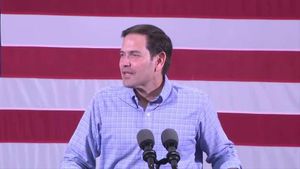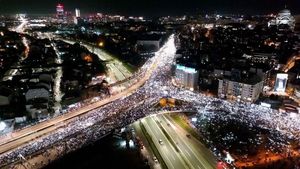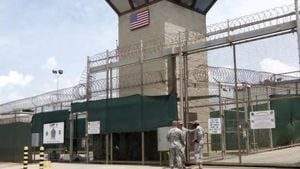Former Prime Minister Imran Khan continues to face significant challenges as he and his wife, Bushra Bibi, have re-filed their appeal against their conviction in the high-profile £190 million corruption case. The couple’s appeal was submitted to the Islamabad High Court (IHC) on January 31, 2025, after previously facing objections from the court's Registrar Office.
Khan, founder of the Pakistan Tehreek-e-Insaf (PTI) party, and Bibi were convicted on January 17, 2025, by the National Accountability Bureau (NAB), with Khan receiving a 14-year prison sentence and Bibi seven years. Following the conviction, they sought to challenge the decision but encountered issues when their initial appeal was returned on January 27 due to formal objections.
The newly filed appeal asserts the NAB's mishandling of the case, claiming it “maliciously misused its powers” and failed to present comprehensive evidence during the trial. Khan’s attorney, Khalid Yousuf Chaudhry, stated the appeal aims to have the original verdict declared null and void. The appeal noted the NAB’s failure to secure the text of the relevant agreement from Britain's National Crime Agency (NCA), which Khan’s legal team argues undermines the prosecution's case.
Alongside the legal fight, Khan has been vocal about the political atmosphere surrounding his case. He reached out to Chief Justice Yahya Afridi and Justice Aminuddin, citing alarming concerns about electoral fraud, human rights violations, and the alleged arrests of PTI workers. Khan emphasized the urgent need for the Supreme Court to intervene amid what he describes as systemic injustices affecting his party and supporters.
The situation has ignited widespread protests across Pakistan, where Khan's supporters have taken to the streets voicing their dissatisfaction with the judicial system and the NAB’s actions. Demonstrations have erupted not only in major cities but also in rural areas, indicating the depth of support Khan still commands within the nation. Protestors are calling for justice and accountability, arguing fiercely against what they perceive as political persecution.
Public sentiment has been intensely polarized, with some viewing Khan as the victim of political machinations, whereas others remain steadfast supporters of the NAB’s actions. The protests have ignited debates about the legitimacy of the accountability process and the broader political strategies employed by the ruling government against opposition leaders.
This tumultuous environment reflects the broader political instability within Pakistan, as Khan's legal issues intertwine with questions about governance, justice, and the future of the PTI party. Observers are closely watching how these developments might affect future elections and the dynamics of power in Pakistan.
While Khan seeks to restore his legal standing through appeals, the growing unrest signifies the rising stakes for both him and the PTI. With each passing day, the nation's eyes remain focused on the outcome of his legal battles and the potential upheaval they could cause within Pakistan's political framework.
Considering the current political volatility, Khan's case may very well reshape the way political accountability is pursued in Pakistan and could set significant precedents for future political conflicts.



